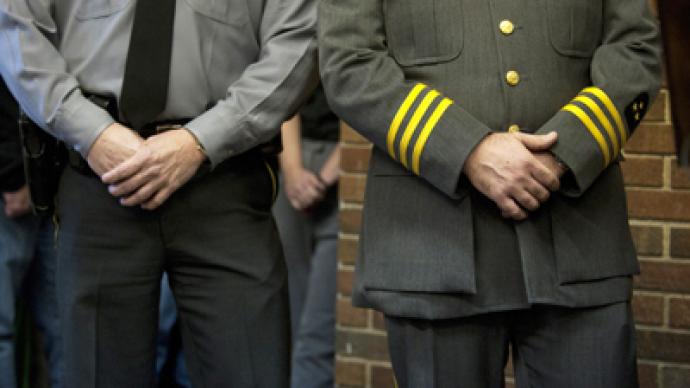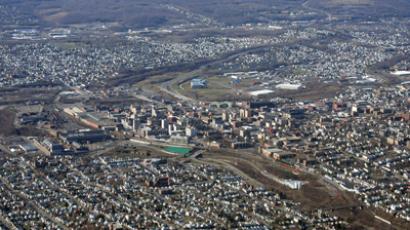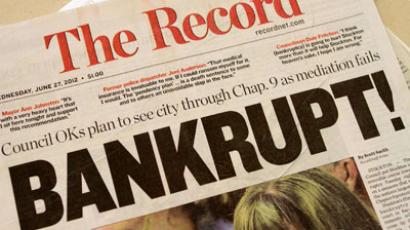Police chief barred from arresting criminals by union rules

Committing a crime just became a whole lot easier to get away with in Scranton, Pennsylvania. A city examiner there this week ruled that the chief of police is prohibited from performing the duties assigned to lesser officers of the law.
Under current labor rules in the city of Scranton, non-union workers are more or less barred from performing the duties guaranteed to members of a bargaining unit. But while most law enforcement officers in the Electric City belong to the local Fraternal Order of Police union, the chief of police has been precluded from joining since 2002 following a decision made by the city’s mayor. Neither the union nor Scranton is arguing to have the chief of police allowed in the FOP, but the workers’ group says that the top officer in the city isn’t permitted to act like a cop, even if he’s the leading figure in the law enforcement community.Of biggest concern among the union are the actions of Dan Duffy, the former Scranton police chief who resigned only this past July. During his two year tenure at the top of the department, the union says Duffy time and time again performed the official duties of his lesser officers. In one instance, he arrested heroin dealers during a drug bust inside of a cemetery. In another, Duffy personally apprehended a person that was the subject of an outstanding warrant.It may sound like the routine work of a police officer, but the Scranton POF says it isn’t allowed.“Historically, the chief has not performed bargaining unit work,” the Scranton Labor Relations Board hearing examiner Jack Marino finds [PDF]. Before Duffy, he says, the chief of police never engaged in patrol activities or performed the work of the bargaining unit — that is, the rest of the department. Instead, says Marino, the chief’s duties are managerial and serve the financial and operational needs of the department. Essentially, says WNEP News’ Stacy Lange, this decision ensures that the chief of police holds on to solely a desk job for the unforeseeable future. The police union asked Marino to intervene after Duffy conducted a series of arrests before his resignation, citing a contract that forbids chiefs from doing the work of bargaining unit members. The union said his behavior constituted unfair labor practices, but the city, which has been on the brink of bankruptcy for months, declined to send an attorney or other representative to present their case during a meeting before the Board. Now in response, Marino is siding with the union and making it clear that no chiefs — now or ever — are allowed to engage in actual police work unless of extraneous circumstances."I did what any public servant should do," Mr. Duffy tells the Scranton Times-Tribune. "I would have never done anything in violation of the law nor do I believe I did anything that I should not have been doing."The union, on the other hand, is applauding Marino’s ruling. "It's labor law," union president Lt. Bob Martin adds to the paper. "If we look the other way, then we lose our exclusivity. … If we were to look the other way, then we would forever give up our right to challenge it again."“The problem we have is when a non-bargaining unit member goes out and seeks out our work and does our work of a bargaining unit member. Then that’s when we have a problem and that’s what this decision is about,” he adds to WNEP."If the chief is standing on the corner, and a crime is being committed in his presence, he is morally and he is legally obligated to act. … Absolutely, no problem with that,” he tells the Tribune. “We endorse that and we would come and aid him in every way. He was doing differently."In the Marino’s findings, he says the arrests performed by Duffy did not fit into a category that warranted immediate intervention from the chief. Those arrests included incidents where Duffy apprehended wanted suspects, mostly drug dealers."I believe a police chief should actively show concern for the city and not be afraid to get involved on the streets," Duffy tells the Tribune. "This is something that should be expected of a police chief. It should not be a group of union leaders saying, 'You can negotiate and we'll give you permission to do something that should not be done' … For somebody to say the police chief is not allowed to go out and look for trouble? Come on." The City of Scranton says they will not fight the ruling since Mr. Duffy is no longer working in local law enforcement. He took a job last year with Lackawanna College. The results of the hearing require the city to cease and desist from interfering with the duties contractually promised to lesser police officers.














